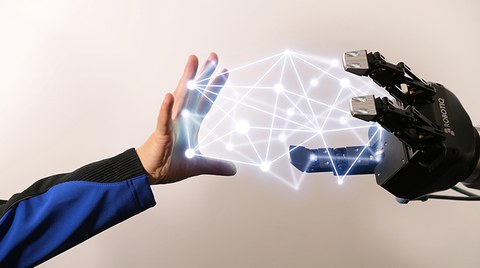Projects
The Faculty's future-oriented and visionary research is reflected in a large number of industrial, DFG and collaborative projects.
The Faculty of Computer Science is significantly involved in outstanding collaborative research centers and large-scale projects.
Table of contents
Research centers
ScaDS.AI (Center for Scalable Data Analytics and Artificial Intelligence) Dresden/Leipzig is a center for data science, artificial intelligence and big data with locations in Dresden and Leipzig. It is one of five new AI centers in Germany that are being funded by the Federal Ministry of Education and Research and the Free State of Saxony as part of the German government's AI strategy. ScaDS.AI Dresden/Leipzig is established as a permanent research facility at both locations and is closely linked to the local universities: TU Dresden and Leipzig University.
Funding: Bundesministerium für Bildung und Forschung (BMBF)
Sächsisches Staatsministerium für Wissenschaft, Kultur und Tourismus (SMWK)
TU Dresden and the Technical University of Munich have joined forces to form the 6G-life research hub to drive cutting-edge research for future 6G communication networks with a focus on human-machine collaboration. The merger of the two universities of excellence combines their world-leading preliminary work in the field of Tactile Internet in the Cluster of Excellence CeTI, 5G communication networks, quantum communication, Post-Shannon theory, artificial intelligence methods, and adaptive and flexible hardware and software platforms.
Funding: Bundesministerium für Bildung und Forschung - BMBF
Duration: 15.08.2021 - 14.08.2025
Else Kröner Fresenius Center for Digital Health
Founded in 2019, the EKFZ for Digital Health is funded by the Else Kröner Fresenius Foundation with a funding amount of 40 million euros over a period of ten years. The center focuses its research on innovative, medical and digital technologies at the direct interface to the clinic. It bundles the expertise of medical and high-tech specialists and brings them together through its interdisciplinary structure and network. The EKFZ aims to foster a new generation of physicians with comprehensive technical knowledge and skills and, conversely, engineers with a deep understanding of medical and patient needs.
High-performance computing at German universities has been structured by the NHR network since 2021. The aim is to provide scientists with the computing capacity they need for their research and to strengthen their competences for efficient use. As one of the 9 NHR centers in Germany, the ZIH specializes in data-driven HPC and high-performance data analysis and supports method development in these areas through HPC architectures with dedicated storage and computing concepts. In the application area, the NHR focus of ZIH is particularly on life sciences and earth system science.
Funding: Federal and state governments
Duration: 2021 - 2031
The Center for Systems Biology Dresden (CSBD) is a cooperation between the Max Planck Institute of Molecular Cell Biology and Genetics (MPI-CBG), the Max Planck Institute for the Physics of Complex Systems (MPIPKS), and the TU Dresden. The interdisciplinary center brings physicists, computer scientists, mathematicians, and biologists together. The scientists develop theoretical and computational approaches to biological systems across different scales, from molecules to cells and from cells to tissues.
Cluster of Excellence
The Center's for Tactile Internet (CeTI)
central vision is to enable humans to interact in quasi real-time with cyber-physical systems (CPS) in the real or virtual world over intelligent wide-area communication networks. Such advances go far beyond the current state-of-the-art approaches in computer and engineering sciences: intelligent communication networks and adaptive CPS for quasi real-time co-operations with humans require online mutual learning mechanisms, which are crucial challenges.
How do the laws of physics shape life itself? Physics has enabled us to predict and control the non-living world around us. However, the mysteries of living matter remain an ongoing quest. Physics of Life (POL) explores the intersection of biology and physics, seeking to uncover the physical principles that govern the dynamic organization of life.
Collaborative Research Center
The goal of the Collaborative Research Center SFB/TRR-248 "Foundations of Comprehensible Software Systems" is basic research for an understandable and comprehensible cyber-physical world. The more cyber-physical technologies permeate and determine our lives, the more important it becomes for our understanding and control that they explain their functionality and behavior.
Funding: Deutsche Forschungsgemeinschaft (DFG)
Duration: 2019 - 2026
School of Embedded Composite Artificial Intelligence (kurz: SECAI)
SECAI is a joint project of TU Dresden and Leipzig University that fosters AI research and higher education. As a DAAD Zuse Schools of Excellence in AI, SECAI integrates university studies, academic research, and industrial applications by fostering students, improving teaching, funding researchers, and supporting exchange. SECAI is guided by two core themes: the development of novel AI methods combining advantages of so far disparate approaches (“composite”), and the integration of AI algorithms into tailor-made microelectronics and intelligent devices (“embedded”).
Funding: Bundesministerium für Bildung und Forschung (BMBF), DAAD
Duration: 07/2022 – 12/2027
Future Robotics Lab
In 2040, many robotic products, services and solutions will support our society worldwide. Robots will revolutionise our world and automate many more tasks of daily life than today. The Future Robotics Lab is dedicated to researching methods, technologies and applications for this robotic revolution.
Research projects at the professorships
The numerous research projects at the Faculty of Computer Science cover the entire spectrum of this subject area - from applied to theoretical computer science.
The research projects of the professorships can be found on the web pages of the professorship and in the research information system of the TU Dresden.










